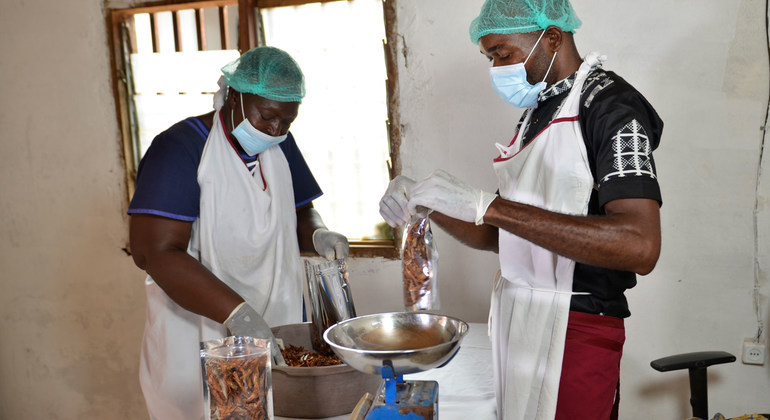Anastasie Obama, a Cameroonian woman who set up her own smoked shrimp business, has been recognized by the UN’s Food and Agriculture Agency (FAO) as a Food Hero, for her contribution towards unlocking the potential of selling shellfish locally and abroad.
Cameroon sits on the Atlantic coast where Western and Central Africa meet. It was named “Rio dos Camarões” or, “River of Prawns”, by Portuguese explorers, because of the abundance of the crustaceans they discovered in the area.
“As a little child, I was always fascinated to see women preparing seafood. When I was seven years old and I was still going to school, I would buy shrimp for my aunt, I would smoke it and then we would sell it. That’s how my business in Yaoundé, the capital of Cameroon began, some years ago.

Shrimp is Cameroon’s main seafood export product., by © FAO/Rocco Rorandelli
I used to cut wood at home and do the smoking and distribute in the village. It was a small operation and I didn’t even have an oven. My husband was very supportive, and I started getting more clients and our shrimp was being sold abroad.
With the little means that we shrimp smokers have, we sell and make a little profit to cover our cost. It’s not enough but we make do.
Today, shrimp is Cameroon’s main seafood export product. I have heard that the shrimp sector employs around 1,500 people and I believe shrimp is healthy food which is eaten by many.
One of the problems we face is that it is hard for us to get fresh seafood and to conserve it.
The COVID-19 pandemic has depressed the local market even more. If we had some capital, we would get a cold chamber to keep our fish and only smoke it when we had an order.
I and others in the business have been supported by FISH4ACP, a global initiative for sustainable fisheries and aquaculture development in Africa, the Caribbean and the Pacific.
It is helping us to unlock the potential of the shrimp sector in Cameroon and support us in making this value chain more competitive and sustainable.
Ultimately, this will improve our livelihoods as well as contributing to economic growth, increased food security and a reduction in the sector’s ecological footprint.
